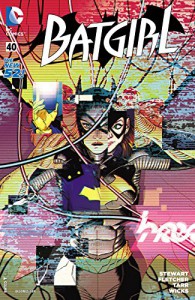Grimlock ♥ Ultra Magnus
I'm a well read grad student who's bluntly honest about all things, although I try to be most honest about myself.
Currently reading










Batgirl fights an AI version of herself...

She scanned her brain as part of an algorithm for her thesis, and the program, with help from Barbara's mind, gained sentence. The problem? She was angry after she was paralyzed - from the little I gather from some of the vague references here. I would assume she was angry for a long time after this. While the algorithm was meant to predict where violence and crime would happen, for means of protection, the sentient program? It's bubbling over with resentment and anger, and it decides that the only way to end crime is to gather those responsible for those future crimes and have them killed.
This becomes even more problematic when you realize that 'future crimes' include hiring someone who will funnel money to terrorists. (Not that I condone funneling of money to terrorists, but the woman who hired the man who funnels the money is not necessarily even aware that this is what's happening. It's unclear and if she's simply hiring a qualified professional who is hiding his terrorist ties, she is innocent. She might be enabling him to send over that money, but she's unaware of the fact that he's planning this, and she may cut off his money by firing him if she's aware. The net is very, very wide is my point in this long aside.)
Moreover, the program may be predicting to a certain degree, but there's no real way to make sure this is 100% accurate. What if that woman who hired the terrorist finds someone more qualified last minute? How can the program be so sure of who she'll hire?
Basically, it's a flawed system that works only because the program is deluding itself; it's so angry, it believes this is the only way to stop crime. But it also works as a mirror to yesteryear Barbara, showing her what she was like before she got some balance and perspective. And it's not a pretty picture. It must have been cathartic to literally be able to speak to younger-Barbara and say everything she'd have wanted to know back then: that there's another way, that she was wrong, that the anger won't last. But it's also a distraction. Barbara gains a new ally - one who knows her secret identity - even as she loses Dinah. (Dinah sees her door closing - all her stuff getting burned down - as a door opening. It brought her to a band, which got noticed by an agent, and now she's off to record an album and go on a tour.) But it's a bittersweet parting, which is better than the fights they'd been having. Dinah stands up for Batgirl at the end of the fight, and gives Batgirl a chance to escape when the police try to arrest her. And Dinah and Babs have a quick making up conversation.

I've been reading - in reviews, comments, and essays, and far too many sources to list them all here - about how hard it is to find positive relationships between women in some fiction. Teen fiction is particularly problematic. One of the reasons I bring this up is that Dinah and Babs have a very realistic, but positive relationship. Yes, they barely talk to each other they're so mad sometimes, but they also make up quickly and don't hold grudges so much that they won't back each other up when they really need it. They love each other unconditionally, and that means telling each other when they mess up. Babs messed up and Dinah called her out on it, loudly, multiple times. Babs doesn't hold that against her, and instead thanks her for telling her like it was when she finally got back on track.
This was a deeply moving conversation for me, no matter how brief. It's nice to see Dinah and Babs really make up, and look back on their mistakes not with regret or rose-colored glasses, but as mistakes made. It presented Dinah with an opportunity and she says she was too hard on Babs. I think it was honestly just a growing pain for Babs, but I also think she now sees how close her friendship is with Dinah and I have a feeling this will only strengthen their friendship in the end.
Overall, very satisfactory. And you know I mean it, because I hate when the AIs lose...



 29
29
 14
14